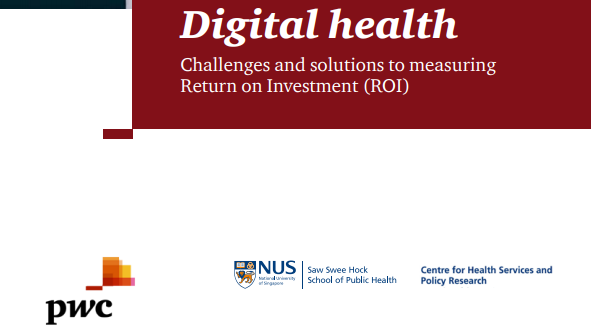
Press release -
PwC report suggests re-defining approaches to measuring return on investments in digital health to drive value-based care
| Date | 12 October 2017 |
| Contact |
Natalie Choo Tel: +65 6236 4309 Mobile: +65 9738 1415 E-mail: natalie.yl.choo@sg.pwc.com Candy Li Tel: +65 6236 7429 Mobile: +65 8613 8820 E-mail: candy.yt.li@sg.pwc.com |
| Follow/ retweet |
@PwC_Singapore |
Singapore, 12 October 2017 – Digital technologies are disrupting the way business is done in many industries and this is no different in healthcare. Despite the clear benefits that digital technologies bring, the healthcare industry has been slower to adopt digital solutions as compared to other sectors.
PwC’s new report, ‘Digital health: challenges and solutions to measuring ROI’, explores the hurdles that the healthcare industry faces when measuring return on investment (ROI) in digital health, and how to understand and measure value when implementing these digital solutions.
Dr Zubin Daruwalla, Healthcare Consulting Director, South East Asia, PwC says:
“We now live in one of the most transformational times in human history and are in the middle of a digital revolution, particularly in healthcare. With more than three billion people worldwide connected to the internet, harnessing the power of digital connectivity will be key to solving healthcare access challenges.
“It is imperative to get ROI measurement methodologies right for digital health investments; something which all economies, both emerging and developed, should bear in mind.”
Key challenges in measuring ROI
There are many hurdles faced by healthcare organisations when thinking of adopting digital health solutions. The adoption of new technology often comes with a new set of issues and risks that drive up the upfront cost and contribute to the inertia to change.
For example, big data has revolutionised healthcare practice by enabling new ways of understanding patients, but costs extend beyond just acquiring the new technology. Healthcare organisations also need to invest in employee training, create governance and compliance strategies, and implement security measures to manage data, ownership and privacy risks, all of which can add up to significant costs.
Meanwhile, another major challenge is the difficulty in defining and measuring value from investments in digital health. The definition of what value entails has traditionally been challenging as cost-benefit perspectives differ between stakeholders, and are subject to an individuals’ preferences and objectives. A healthcare provider may attribute value in care delivery through financial tangibility and metrics, but that may not be the case for patients who may equate the same with improvements in their health outcomes.
David McKeering, Public Sector & Health Industries Leader, South East Asia, PwC says:
“When measuring ROI, there is no ‘one size fits all’ approach. As healthcare systems in Southeast Asia become increasingly robust and formalised, measurements of ROI will have to be taken in the context of the healthcare system in that country or region.”
ROI measurements reimagined – a case study
PwC has proposed a holistic framework for healthcare organisations to measure ROI from both a monetary perspective and non-monetary perspective and drive value to their business and customers.
An analysis by the NUS Saw Swee Hock School of Public Health’s Centre for Health Services and Policy Research and PwC found that patients with abnormal post-screening results were nearly six times more likely to follow up via virtual consults with a physician than via in-person consults with a general practitioner. Based on calculations, administering virtual consults can potentially translate to about five times greater savings for patients and their payers over long term as a result of averted future in-patient admissions for diabetes.
Associate Professor Joanne Yoong, Director, Centre for Health Services and Policy Research, NUS Saw Swee Hock School of Public Health concludes:
“As digital technology becomes an integral part of healthcare systems around the world, ensuring the successful and scalable translation of innovative thinking into public health outcomes requires productive collaborations and partnerships between academia, policymakers and entrepreneurs.
As our understanding of emerging new technologies is continually evolving, any one partner may not have all the answers and making open, transparent and critically-minded dialogue about the benefits and costs to various different stakeholders is more crucial than ever.”
ENDS
Notes to editors:
About the case study
The case study is based on primary data from a community-based health screening initiative in Singapore – studied by the National University of Singapore’s Centre for Health Services and Policy Research, and PwC. The virtual consults with a physician refer to MyDoc, a Singapore-based digital health platform.
Related links
Topics
Categories
About PwC
At PwC, our purpose is to build trust in society and solve important problems. We’re a network of firms in 158 countries with more than 236,000 people who are committed to delivering quality in assurance, advisory and tax services. Find out more and tell us what matters to you by visiting us at www.pwc.com.
PwC refers to the PwC network and/or one or more of its member firms, each of which is a separate legal entity. Please see www.pwc.com/structure for further details.
© 2017 PwC. All rights reserved



